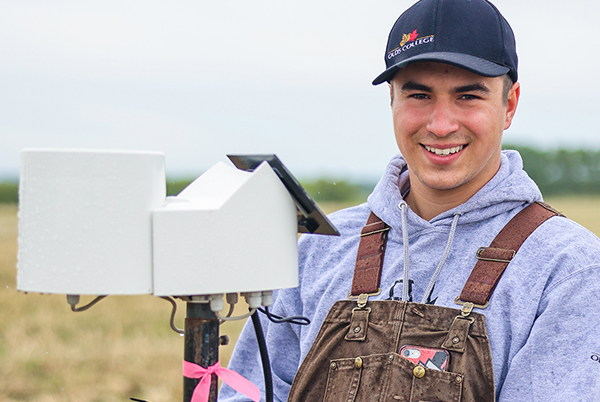Olds, Alberta, Canada, June 17, 2021 - Olds College announces the launch of the Pan-Canadian Smart Farm Network—a network of Smart Farms committed to sharing data and expertise that will help farmers, industry and developers better understand, use and develop smart agricultural technologies.

With funding from the Canadian Agri-Food Automation and Intelligence Network (CAAIN), the Pan-Canadian Smart Farm Network, lead by the Olds College Smart Farm, includes Glacier FarmMedia Discovery Farm located at Langham, Saskatchewan, and the Lakeland College Student-Managed Farm - Powered by New Holland at Lakeland’s Vermilion campus in eastern Alberta. The first project for the network will evaluate the functionality, connectivity and value of data collected from a common suite of sensors measuring soil, climate and crop conditions at sites in three provinces.
For Dr. Joy Agnew, Associate Vice-President of Applied Research at Olds College and Principal Investigator for the project, the collaboration across different agriculture zones and land bases brings more depth to the results of the evaluation, and that will benefit farmers and developers.
“Independent validation of ag technologies is critical and so is ensuring that validation is done using more than a single Smart Farm,” comments Dr. Agnew. “By joining with other partners, we’ll be providing farmers with information that will meaningfully inform their decisions about how and where to use sensor technology.”
Each project site has installed METOS Canada’s wireless sensors and devices that provide data including field monitoring, weather monitoring and forecasting, water management, disease modelling, insect monitoring and nutrition management. Some sites will use the data to make on-farm management decisions like timing of fungicide application, and will evaluate the benefit of using data to manage those decisions.
“Being part of this project builds on our mandate to connect farmers with industry and research partners to find practical solutions to ag challenges,” said Blake Weiseth, Applied Research Lead at Glacier FarmMedia Discovery Farm and Agriculture Research Chair at Saskatchewan Polytechnic. “We’ve used METOS sensor data in our field-scale projects for a couple of years and now, having access in real time to similar data from other sites in Canada will expand our understanding of its value.”
At Lakeland College, project activities will be integrated into its Crop Technology, Animal Science Technology and Bachelor of Agriculture Technology programs, providing additional real-world learning opportunities for students. “We need to ensure our students understand the value and benefits of using data, and providing tangible experiences is the best way for them to learn,” says Josie Van Lent, Dean, Agriculture Technology & Applied Research at Lakeland. “For producers, our smart farm activities will demonstrate the adoption of new technologies, providing them with independent assessments of feasibility and usefulness. Overall, this smart farm collaboration will further catalyze innovation in the Canadian agriculture technology sector and support producers.”
“Supporting the development of smart farms is one of our research pillars,” said CAAIN CEO, Kerry Wright. “When Olds College submitted this project for consideration, we were immediately intrigued. Smart farms validate and demonstrate the use of innovative agricultural technology in a specific environment, and they provide opportunities to train students enrolled in post-secondary agriculture programs on the latest trends in ag-tech. The pan-Canadian network concept’s additional advantage is its opportunity to link smart farms across the country, thereby multiplying learnings and increasing the value of any data generated.”
Work is underway to find additional smart farm network members across Canada. There will also be opportunities to link the Pan-Canadian Smart Farm Network with other smart farms around the world.
“With additional partners come additional opportunities in applied research and education that will help producers maximize technology and data when they’re making those sometimes tough management decisions based on the realities of what’s happening in their fields,” says Agnew.
-30-